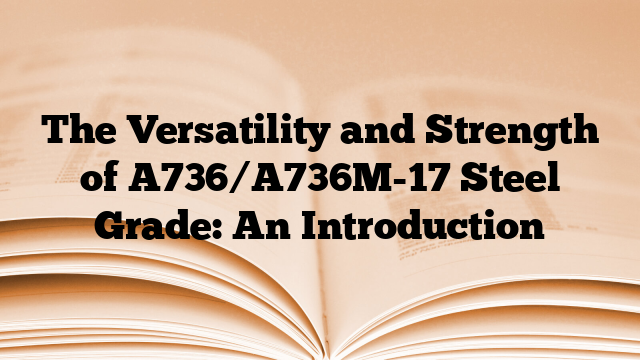to ASTM A736/A736M-17
Chemical Composition:
– Carbon: 0.18% max
– Manganese: 0.60-1.35%
– Phosphorus: 0.035% max
– Sulfur: 0.035% max
– Silicon: 0.15-0.50%
Mechanical Properties:
– Yield strength: 60 ksi (415 MPa)
– Tensile strength: 80-100 ksi (550-690 MPa)
– Elongation: 22% min
– Charpy V-notch impact value: 30 ft-lbf (41 J) min at -50°F (-46°C)
Standard number: ASTM A736/A736M-17
Introduction:
A736/A736M-17 is a low carbon, low alloy steel grade that offers excellent versatility and strength for various applications. It is commonly used in pressure vessels and is suitable for welding, forming, and fabricating. This steel grade is known for its high yield and tensile strength, making it ideal for use in demanding and critical environments. Additionally, its good impact resistance at low temperatures makes it suitable for use in cold climates.
The chemical composition of A736/A736M-17 steel grade includes carbon, manganese, phosphorus, sulfur, and silicon. The carbon content is limited to ensure good weldability, while the manganese content contributes to the steel’s strength and toughness. Phosphorus and sulfur are controlled to enhance the steel’s cleanliness and reduce the risk of impurities. Silicon provides deoxidization and improves the steel’s strength and impact resistance.
In terms of mechanical properties, A736/A736M-17 steel grade has a yield strength of 60 ksi (415 MPa), which means it can withstand a certain amount of stress without permanent deformation. Its tensile strength ranges from 80 to 100 ksi (550-690 MPa), indicating its ability to resist pulling forces. The elongation of this steel grade is 22% minimum, indicating its ability to stretch before breaking. The Charpy V-notch impact value is 30 ft-lbf (41 J) minimum at -50°F (-46°C), indicating its resistance to brittle fracture in cold temperatures.
Overall, A736/A736M-17 steel grade offers a combination of versatility, strength, and impact resistance, making it a suitable choice for various industrial applications. Its excellent mechanical properties and controlled chemical composition contribute to its reliability and performance in demanding environments.

